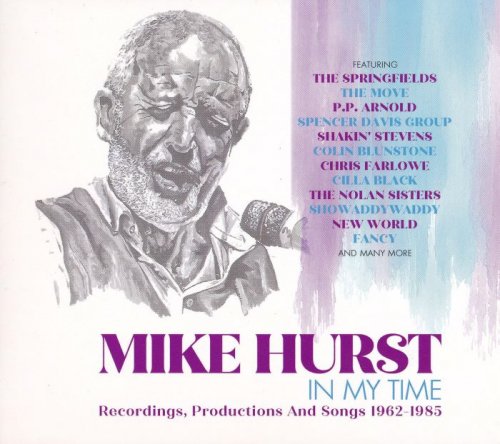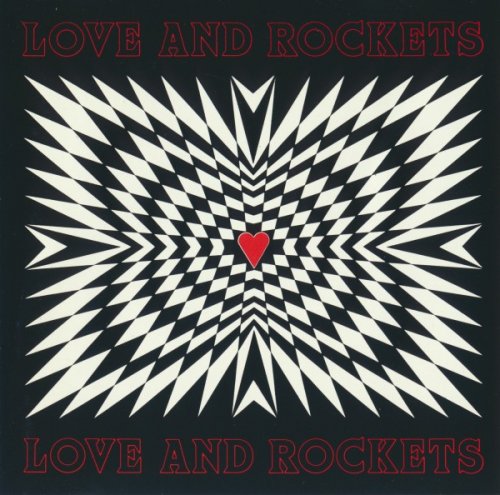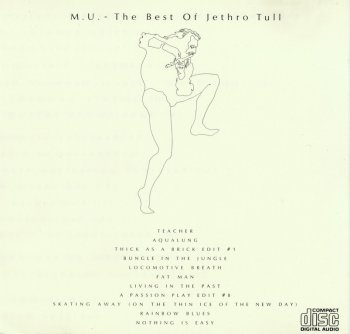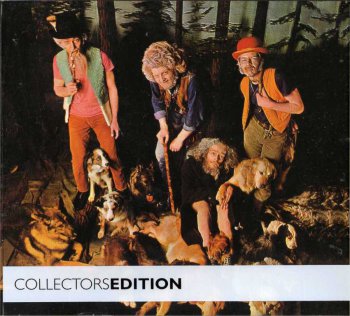Mike Hurst - In My Time (Recordings, Productions And Songs 1962-1985)(2021) 4CD
Artist: Mike Hurst Title Of Album: In My Time Year Of Release: 2021 Label (Catalog#) : Strawberry CRJAMC005 Country:: UK Genre: Pop, Pop Rock, Mod, Beat Quality: FLAC (tracks+cue,log) Bitrate: Lossless Time: 04:42:58 Full Size: 1.74Gb(+3%)(covers+book/20page) Info: wiki Upload: xfile.cloud

Mike Hurst - In My Time (Recordings, Productions And Songs 1962-1985)(2021) 4CD
Artist: Mike Hurst Title Of Album: In My Time Year Of Release: 2021 Label (Catalog#) : Strawberry CRJAMC005 Country:: UK Genre: Pop, Pop Rock, Mod, Beat Quality: FLAC (tracks+cue,log) Bitrate: Lossless Time: 04:42:58 Full Size: 1.74Gb(+3%)(covers+book/20page) Info: wiki Upload: xfile.cloud
07 10, 2025
Love And Rockets - Love And Rockets (1989)
rip by Boris1 Performer: Love and Rockets Album: Love and Rockets Label: Beggars Banquet/ RCA Catalog #: 9715-2-R Style: Alternative Rock Year: 1989 Format: Flac (*image + .cue,log,scans) Bitrate: lossless Covers: in archive Amount of tracks: 10 Recovery: 3% Size Rar: ~ 244 MB Upload: xfile.cloud Recovery: 3% Password: sim-sim Love and Rockets - четвертый студийный альбом английской alternative rock band Love and Rockets вышедший в 1989. Альбом включал в себя главный хит Love and Rockets - So

Love And Rockets - Love And Rockets (1989)
rip by Boris1 Performer: Love and Rockets Album: Love and Rockets Label: Beggars Banquet/ RCA Catalog #: 9715-2-R Style: Alternative Rock Year: 1989 Format: Flac (*image + .cue,log,scans) Bitrate: lossless Covers: in archive Amount of tracks: 10 Recovery: 3% Size Rar: ~ 244 MB Upload: xfile.cloud Recovery: 3% Password: sim-sim Love and Rockets - четвертый студийный альбом английской alternative rock band Love and Rockets вышедший в 1989. Альбом включал в себя главный хит Love and Rockets - So
07 10, 2025
ITALO-DISCO «MEGA Collection 'Golden Disco Series'» Part 2 (84 × CD • ESonCD/DWS/ZYX • Issue 2003-2025)
Performer: ♫ ITALO-DISCO Album / collection: «MEGA Albums Collection Best’80» +++++ Series: Golden Disco Series— Label: (c)(p) 1977-2025 ESonCD + DWS + ZYX Music. Source: Rip by KoGGaN™ scans by inet… Official DR value: •10•12•12•9/9•10/9• •9/10•9•12•7/7•9•10•9/9•10/9•9/10•9/10•9/10•6•7•12•13•9/10/10/10/10•8/9•9•15•12•11•8/7• •13•14•14•14•13•11•14•9•12•11•7•9•5/5•13•11•13•14•7•14•9•9•10•8/8•13•9/9•8•5/6•12•11• •10•13•10•13•12•12•12•8/7/7•9•8•13•13•13•12•5•7•12•13•14•13•14•11•12•11•11•11•11•11•

ITALO-DISCO «MEGA Collection 'Golden Disco Series'» Part 2 (84 × CD • ESonCD/DWS/ZYX • Issue 2003-2025)
Performer: ♫ ITALO-DISCO Album / collection: «MEGA Albums Collection Best’80» +++++ Series: Golden Disco Series— Label: (c)(p) 1977-2025 ESonCD + DWS + ZYX Music. Source: Rip by KoGGaN™ scans by inet… Official DR value: •10•12•12•9/9•10/9• •9/10•9•12•7/7•9•10•9/9•10/9•9/10•9/10•9/10•6•7•12•13•9/10/10/10/10•8/9•9•15•12•11•8/7• •13•14•14•14•13•11•14•9•12•11•7•9•5/5•13•11•13•14•7•14•9•9•10•8/8•13•9/9•8•5/6•12•11• •10•13•10•13•12•12•12•8/7/7•9•8•13•13•13•12•5•7•12•13•14•13•14•11•12•11•11•11•11•11•
07 10, 2025
Жанры
Lossless Galaxy Release
Русская музыка
--Поп
--Рок
--Панк
--Альтернатива
--Металл
--Рэп, Хип-Хоп, R'n'B
--Джаз и Блюз
--Фолк
--Шансон, Авторская песня
--СССР
Зарубежная музыка
--Pop
--Rock
--Hard Rock
--Progressive & Art-Rock
--Pop-Rock & Soft Rock
--Instrumental Rock
--Heavy, Traditional, Industrial Metal
--Power, Gothic, Sympho Metal
--Thrash, Speed, Groove, Modern Metal
--Death, Melodic Death, Doom, Dark Metal
--Black, Pagan, Folk, Viking Metal
--Alternative
--Punk
--Disco, Eurodance
--Rap, Hip Hop, R'n'B
--Reggae, Ska, Dub
--Jazz, Blues, Soul
--Folk, Country, Ethnic
--Electronic, Ambient, New Wave
--House, Techno, Trance
Другие жанры
--New Age, Relax, Meditative & Flamenco
--Chillout, Lounge, Downtempo, Trip-Hop
--Drum & Bass, Jungle, Breakbeat, IDM
--Classical / Классическая музыка
--Soundtrack
--Музыкальные сказки
Vinyl Rip
HI-Res / DVD-Audio / DTS
--SACD
--DSD
--DVD-Audio
Сборники Lossless-Galaxy
Альбомы 2022
Альбомы 2023
Альбомы 2024
Теги
1st Press 2022 2023 2024 2025 70... AOR Black Metal Blues Blues Rock Bootleg Series Classic Rock Death Metal Discography Exclusive for Lossless-Galaxy Folk Rock Fusion Hard Rock Heavy Metal Hi-Res Japanese Edition Jazz Jazz Rock lossless Melodic Death Metal Melodic Rock Modern Electric Blues Pop Pop Rock Power Metal Prog Rock Progressive Metal Progressive Rock Psych Rock Psychedelic Rock Rock SACD Symphonic Metal Thrash Metal Дискографии от KoGGaN
Архивы
Опрос
В каком формате хотели бы видеть релизы на сайте ?
 Автор: LeddZepp, 24 апреля 2024, Комментариев: 0, Просмотров: 325
Автор: LeddZepp, 24 апреля 2024, Комментариев: 0, Просмотров: 325Jethro Tull - This Was [Vinyl Rip] (1968)
![Jethro Tull - This Was [Vinyl Rip] (1968)](/uploads/posts/2024-04/jethrotull68thiswas_lp_500.jpg)
Year: 25 October 1968 (LP Jun 2014)
Label: Chrysalis Records (UK & Europe), 0825646307807
Style: Progressive Rock, Folk Rock, Blues Rock
Country: Blackpool, Lancashire, England
Time: 38:10
Format: Flac Tracks 16/44,1 kHz
Size: 256 Mb
Charts: UK #10, GER #28, US #62.
"This Was" ("Это было") - дебютный студийный альбом британской рок-группы Jethro Tull, выпущенный в 1968 году. Как и большинство дебютных альбомов исполнителей, только начинавших свой творческий путь, "This Was" - малобюджетный проект, запись этого альбома стоила группе лишь 1200 фунтов стерлингов. Это очень неоднозначный альбом, на котором узнаваемый в дальнейшем стиль группы еще не сформировался. Буквально все музыкальные критики тех времен, да и сейчас, спустя 46 лет после его выхода, затрудняются, как же правильно классифицировать музыкальный стиль, продемонстрированный музыкантами при исполнении номеров этого альбома. Причем подавляющее большинство критиков вовсе «не ругают» эту пластинку. Просто они честно заявляют - "Мы не знаем, как всё это назвать! ".
Действительно, на этом альбоме присутствует всего понемногу - и блюз, и рок с элементами фолка и даже джаз, как, например, в кавер-версии инструментальной пьесы американского джазового композитора Роланда Кёрка "Serenade to a Cuckoo". Но в некоторых номерах, таких как "My Sunday Feeling" и "Beggar’s Farm", уже чувствуется стиль классического Джетро Талл, к которому мы уже все привыкли. Думаю, что нет смысла искать подходящее название стилю этого альбома. И пусть эта пластинка не оставляет впечатления целостности и законченности - не это в ней главное. Главное в том, что этот альбом показал - для его записи собрались очень талантливые музыканты, у которых впереди большое будущее. Талантливые, как в исполнительском, импровизационном, так и в композиционном отношениях. Настолько талантливые, что сразу и не понятно, в чем же основная доминанта этого альбома - в гитаре Мика Эбрахамса или во флейте Йена Андерсона?
Что было после выхода этого альбома, истории хорошо известно. Таланты, если их интересы во многом не совпадают, парами в обнимку не ходят. Было видно - кто-то из этих двух лидеров группы должен отойти в сторону.
Ушел Эбрахамс. Что было бы с Jethro Tull, если бы он остался, а группу, например, покинул Йен Андерсон? Это, видимо, трудно представить, но боюсь, что в этом случае, сейчас... не пришлось бы писать эту статью и все последующие эссе, посвященные остальным 40 альбомам Jethro Tull. История не признает сослагательных наклонений - случилось то, что случилось. А в результате мы имеем то, что имеем: более сорока альбомов "Jethro Tull", очень разных, но очень интересных и неповторимых, имеем множество сольных проектов Йена Андерсона и еще несколько очень неплохих альбомов Мика Эбрахамса в составе возглавляемых им блюз-роковых групп "Blodwyn Pig" и "The Mick Abrahams Band".
Но напоследок возникает самый последний вопрос - а было бы всё это, если бы тогда, в том далеком 1968 году, встреча этих двух великих музыкантов, Мика Эбрахамса и Йена Андерсона, не состоялась под вывеской "Jethro Tull"?
Но ведь это было...?! Да, "Это было".
(stihi.ru/2014/07/20/2560?ysclid=lvbf7fnay6104491855)
01. A1 My Sunday Feeling (03:42)
02. A2 Some Day The Sun Won't Shine For You (02:46)
03. A3 Beggar's Farm (04:22)
04. A4 Move On Alone (01:57)
05. A5 Serenade To A Cuckoo (06:05)
06. B1 Dharma For One (04:13)
07. B2 It's Breaking Me Up (05:02)
08. B3 Cat's Squirrel (05:39)
09. B4 A Song For Jeffrey (03:23)
10. B5 Round (00:57)
При желании можно посмотреть все мои публикации на сайте. Приятного прослушивания. Жмём и смотрим (Click to see all of my posts)!
Внимание! У Вас нет прав для просмотра скрытого текста.
Похожие новости:
Комментарии отсутствуют
Добавить комментарий!
Информация
Посетители, находящиеся в группе Гости, не могут оставлять комментарии к данной публикации.

![Jethro Tull - Jethro Tull FM Broadcast April 1968 (2020) [FLAC]](/uploads/posts/2020-10/1601895863_jethro-tull-jethro-tull-fm-broadcast-april-1968-2020-flac.jpg)
![Jethro Tull - This Was [Japanese Edition, 1-st press] (1968)](/uploads/posts/2017-07/1499715219_jet_this.jpg)

![Jethro Tull - This Was [Chrysalis, UK, LP (VinylRip 24/192)] (1968)](/uploads/posts/2012-11/thumbs/1352188441_002.jpg)
